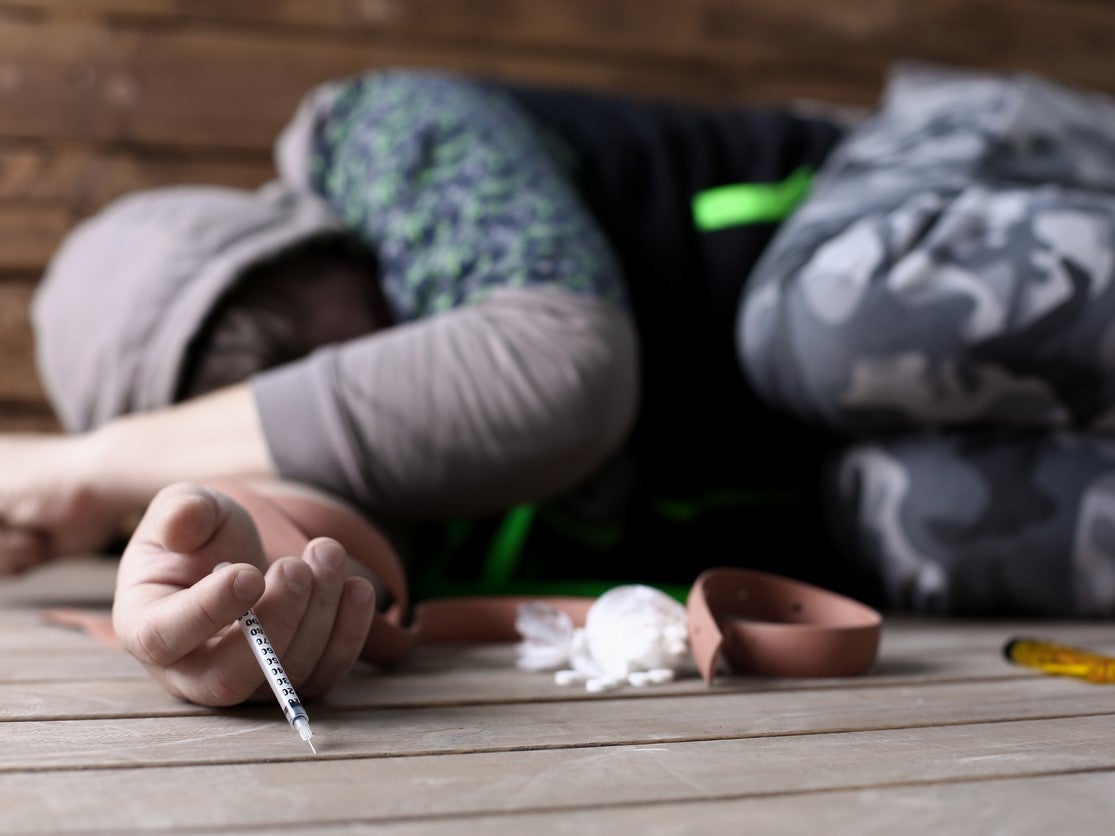‘Society judges women more harshly for addiction’: Women locked out of ‘intimidating’ drug treatment services
Exclusive: ‘I would take what I needed to get to that place of complete oblivion,’ Lara tells Maya Oppenheim


Women face extra hurdles in battling addiction because male-focused drug support services are neglecting their needs, new research has found.
The study, carried out by With You, the UK’s leading drug, alcohol and mental health charity and shared exclusively with The Independent, suggests many women find addiction support services daunting and intimidating.
Researchers said women are grappling with a postcode lottery, warning the system overlooks the fact they have often suffered child abuse, family upheaval, domestic violence and other forms of trauma.
Lara* spent three decades struggling with addiction to heroin, crack cocaine and alcohol. The 57-year-old, who has now been clean for almost three years, stopped recognising herself at her darkest moments, finding she was willing to do anything to score drugs.
Throughout her life she has found drug treatment services frightening, male-dominated places, designed by and for men and which neglect women’s needs.
“Without a doubt, services are very male-dominated,” Lara, who is from London, says. “Of course it was intimidating. I would be the only woman. I ended up with a woman drug worker. She was the only person that I’d ever seen that fought my corner. A lot of them gave up on me.”
Lara, who has three children, says it was difficult having to confide in men working in drug treatment services due to having had such difficult experiences with men in her life. “When you go through the things you go through out there, the last thing you want to do is tell a man,” she says. “You get to the stage where you don’t trust anybody. Especially men. It is very different having a woman sitting there.”
The study was based on extensive research across 80 different places across England and Scotland, with researchers carrying out surveys and interviews with women who use drug treatment services, as well as frontline staff, and analysing documents obtained via Freedom of Information requests.
Data the charity also shared exclusively shows 63 per cent of people who used their online webchat were women between May 2020 and April 2021. Since the organisation launched the online service in 2017, in a bid to make support more inclusive, the amount of women accessing help has remained relatively steady. Many of the women who accessed the service said they preferred seeking support for their addiction online rather than using traditional drug treatment services.
Lots of terrible things happen out there. Rape, gang rape, jumping into cars, jumping out of windows away from pimps and dealers
Lara, who had one child taken away from her at birth due to her drug use, says she had been trying to get clean from 1995 but had never managed it. She was the second youngest of six children but four of her siblings have died over the years, with two of them also suffering from addiction issues.
She says she had experienced domestic abuse, adding that she has been in four rehabs and gone through at least 11 detoxes, as well as serving multiple short prison stretches. “I have always been on methadone when I was in prison. I went out after I was released and got back on it. That is all I knew. Lots of terrible things happen out there. Rape, gang rape, jumping into cars, jumping out of windows away from pimps and dealers. I suffer from bad memory loss. I think it is from trauma.”
“I was injecting in my groins,” she admits. “An injury exploded so they wanted to cut my leg off. I walked out of the hospital to go get a bit of gear to inject in the other side. I didn’t care what I took. I was one of those addicts where someone would say, ‘I’ve got some pills’. I would take them and then ask what it was. I could not get out of my head enough, I would take what I needed to get to that place of complete oblivion.”
At one of her lowest moments, Lara ended up in a psychiatric hospital as she was suffering from psychosis. She was just six and a half stone at this point. “I was doing whatever to get what I needed,” she reflects. “I did street sex work, I would steal stuff. I went to jail. I had lots of relationships which were very toxic.”
But Lara is in a radically more positive place now than that she found herself in while in the depths of addiction, even winning a volunteer of the year award. She now lives in her own flat – just five minutes away from the beach – and mentors women who have experienced domestic abuse, sexual violence, and drug addiction, as well as helping those who were living on the streets during the pandemic.
She says she can’t put into words how she feels now that she is clean, adding that it feels like she has been given a second chance. “It has made me quite a strong woman,” she reflects. “I am very resilient.”
In the first three months of the pandemic reports of domestic abuse which With You received from women accessing their drug treatment services in Liverpool rose by 12 per cent.
Siobhan Peters, who leads on women and addiction at the charity, explains that when women in active addiction suffer domestic abuse, their coping mechanisms rise, and their drug usage subsequently goes up.
“Liverpool was not unique, all of our services saw this rise in domestic abuse,” Ms Peters explains. “One of the reasons why there was a rise in women’s problematic drug use in the pandemic was because of financial pressures. This includes job losses which hit women harder and women being forced to shoulder much of the burden of homeschooling.”
The research her charity shared with The Independent found there is a stark dearth of analysis about women’s experience of drug-related issues. “Because the majority of the people who access addiction services are male, services have come to be designed for men,” Ms Peters says. “If you come into the reception area of drug treatment centres, it is mostly men there. A lot of women will have had traumatic experiences with men.”
The expert, who worked in drug treatment services for over a decade, says there may be men at services women recognise who have abused them previously. She notes women are also at risk of meeting men in community drug treatment centres who go on to financially or sexually exploit them, adding that they may coerce them into switching dealers to get money from them.
Ms Peters criticises the rigid nature of many drug services in the UK, saying they do not cater for the fact many women have childcare responsibilities. She is calling for drug services to be rolled out in community services which women already access such as women’s centres or children’s centres.
“Sometimes it is really simple things that will make ourselves more accessible for women, like not giving them appointments at school run times, or having a smaller room set aside as a women-only space like some services already do,” Ms Peters says.
She adds that she is not surprised With You’s webchat has been used by substantially more women struggling with addiction than men, due to the fact it can be done from home at a variety of times and does not involve accessing “potentially intimidating, male-dominated” in-person services.
“Practically every woman who has walked through our doors has had a traumatic experience in their lives,” she says. “It is much harder for women to own up to addiction. Society judges women more harshly for addiction than men. There is a lot of stigma around women accessing services. Many women we help say they haven’t accessed services because they are afraid of social services taking their kids. That does not always happen, a lot of women do keep their children, but that is the perception.”
She warns it is particularly difficult for women from certain cultures to access drug services due to there being higher levels of shame linked to addiction.
*Name changed to protect identity
Join our commenting forum
Join thought-provoking conversations, follow other Independent readers and see their replies
Comments





Bookmark popover
Removed from bookmarks